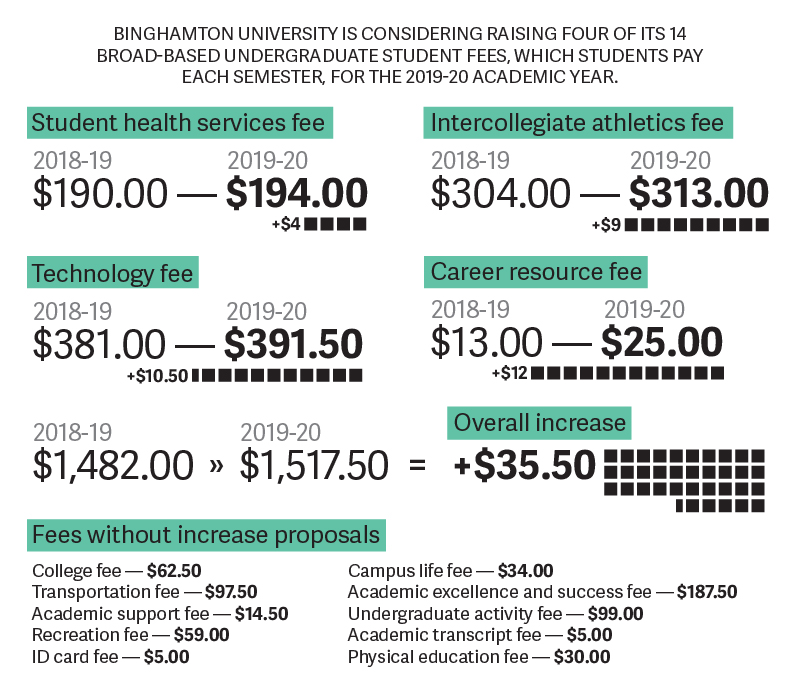According to Student Association (SA) Congress minutes from Jan. 28, Binghamton University is considering raising several broad-based student fees for the upcoming academic year. Out of the 14 fees included in BU’s cost of attendance, four are proposing raises.
According to Harry Bittker, BU Council student representative and a senior majoring in political science, raises to the student health, career resource, technology and athletics fees are all currently being considered.
The student health fee, which could be raised from $190 to $194, will cover costs of additional personnel. This is similar to a fee increase the University requested last year that was rejected by the SUNY system. The career resource fee, which may be raised from $13 to $25, will add two new professional staff to support an expansion of offered programs and services in the Fleishman Center for Career and Professional Development. The technology fee could go from $381 to $391.50, an increase which will cover new projects, including extending Wi-Fi coverage and campus internet infrastructure, expanding cell coverage in buildings on campus and building a secondary data center in Johnson City. The athletics fee could also see a raise, increasing from $304 to $313. If the increase passes, it would be used to supplement SUNY’s increased out-of-state tuition to ensure BU remains a competitive destination for out-of-state athletes.
Additionally, SUNY is expected to approve a $200 increase in tuition for BU, the maximum amount tuition can increase each year.
Bittker wrote in an email that the fee increases are somewhat related to the ongoing budget issues between BU and New York state, but aren’t entirely because of the University’s budgetary situation.
“Obviously, when New York state negotiates contract increases and doesn’t supply the necessary funding to cover it, that will strain campuses and ultimately students,” Bittker wrote. “But on the other hand, each proposal does emphasize adding value for students. It’s encouraging that the proposals emphasize improvement and advancement, rather than just trying to stay afloat.”
But Michael McGoff, senior vice provost and chief financial officer at BU, wrote in an email that the proposed fee increases have no direct connection to the University’s budgetary situation.
“Mostly, the fees generated directly fund the area supported by that fee,” McGoff wrote. “However, negotiated salary increases of staff supported by a particular fee must be covered by the income from that fee.”
Bittker, who has been working with the University over the course of the year to gather more student input on how and where fees are being allocated, plans to launch a webpage where students can submit feedback on the proposed fee increases. He wrote that students should utilize this webpage when it is launched, in addition to talking to state legislators about the costs of tuition.
“Personally, I think it’s incredibly important that students know about [the webpage], as it’s probably our farthest-reaching attempt to gather student input since SUNY started requiring it,” Bittker wrote. “Additionally, I think it’s important that students recognize the connection between their tuition bills and the decisions made in the state legislature, and more important that students recognize their own responsibility as constituents and citizens to tell their elected officials how the lack of additional state funding is impacting them, their families and their futures.”
According to McGoff, there is a maximum amount that fees can increase by. However, this number is dynamic and calculated by a weighted five-year average of the Higher Education Price Index (HEPI), which is up to SUNY to determine each year.
“Each year, SUNY sets the maximum increase on broad-based fees on a calculation of the weighted five-year average of the HEPI,” McGoff wrote. “For the 2019-20 year, that HEPI index is in the neighborhood of 2.8 percent.”
McGoff said the process of consulting with organizations on fee increases differs based on who is conferred. Ultimately, SUNY decides how much each fee may increase in accordance with the HEPI.
Carolyn Hampsey, a junior majoring in history, said she was concerned about why the fees could increase.
“The school’s budgetary situation is worrisome and people want the school to maintain its high status within the SUNY system,” Hampsey said. “Any fee increase might be a response to this fiscal situation.”



